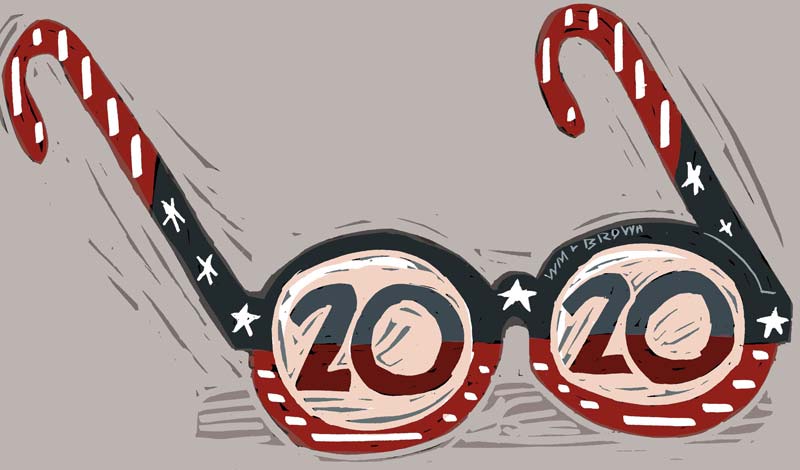
But for those who can't wait to know what will happen, a new poll of Wall Street insiders finds that 70 percent of those polled told the RBC Capital Markets investment they expect Donald Trump to win election to a second term. Since money talks and bullshine walks, a lot of investors will take this to the bank.
This accords with what the economists at Goldman Sachs, the loudest voice on the street, are telling their follow­ers. Incumbent presidents have a "built-in advantage" of 5 to 6 percent of the popular vote, says Jan Hatzius, Goldman's chief economist, and that counts for a lot.
"The advantage of first-term incumbents and the relatively strong economic performance ahead of the presidential elec­tion suggests that President Trump is more likely to win." A close call, perhaps, but a close call it all it takes. A close call is what got Donald Trump to the White House.
Wall Street, like everyone else, called it for Hillary Clinton in 2016, so the opinion of these highly paid economists might be worth little more than the opinion of your neighborhood bartender. You might as well ask Alexandria Ocasio-Cortez, late of the bartending profession, who affects to know it all. Wall Street opinion is always hedged with a lot of maybe, perhaps, could be, what ifs and chances are, and rarely boils down to the finality of James Carville's famous no ifs and no buts: "It's the economy, stupid."
However, economists are not the most reliable prognos­ticators, often no more reliable than newspaper columnists, the smartest of whom do not deal in predictions. All the pundits have on offer are their opinions, educated by experi­ence as they may be. But people who entrust their money to the tender loving care of others figure that if economists can be trusted with their money they must be smart, or at least clever.
Joe Biden is the unsentimental favorite of many econo­mists because good old Joe is considerably friendlier to busi­ness than the polyglot collection of mayors, senators, coffee roasters, entrepreneurs, publisher, a spiritualist, perhaps eventually a governor or two and others with imaginations fertile enough to see themselves in the White House months hence. So far there's not an out-of-work former alder­man in the race, but the night is young.
If sentiment alone fed Wall Street expectations good old Joe would be in like Flynn. Early surveys of Wall Street senti­ment favored the former vice president, sometimes by double digits, but the latest poll, with results out Monday, show him trailing Bernie Sanders, proving that this year you can't keep an old geezer down.
New polling by Emerson College of Boston — which is more famous as a film school, teaching how to transform fantasy into two hours of fake reality — suggests that in head to head match-ups Joe Biden would be the strongest oppo¬≠nent for the president. If he's not that, he promises the most entertaining match-up. He once fantasized taking the Donald out behind the high-school gym to administer a needed licking, and the president only the other day challenged the former vice presi¬≠dent to "bring it on." Old geezers like to have fun, too.
Mr. Biden, the Emerson pollsters say, would poll 53 per­cent against 47 percent for the president. Bernie would win, 51 to 48; Beto 51 percent to 49 percent, and the president would prevail against Mayor Pete by 51 percent to 49 and against Pocahontas by 52 to 48. The president and Kamala Harris are tied at 50 percent each.
This arithmetic is mostly a parlor game for pundits and pollsters this far out; such numbers are meaningless as predicting what will actually happen. If you ask a pollster who will win an election a year in advance the reply will invariably be, "tell me who the candidates are." But parlor games are fun, which is why nearly everybody loves to play them.
The only reality now is that the president seems to be in pretty good shape. Though individual taxpayers have different Tax Day stories to tell, with some paying more this year than last and some paying less, Mr. Trump's $1.5 trillion (that's trillion with a "t") tax-cut package and unpromised government spending have delivered an economic growth rate at nearly 3 percent for the year 2018.
Some polls put the president's approval rating in the 40 percent range, some more than that. Rasmussen, the most re­liable political pollster over the past few election cycles, puts the number above 50 percent. That, Wall Street wise men are saying, might be just about enough to win a second term in the White House. Democrats apparently are still counting on their coup to avenge Hillary. It has failed so far but it's all they've got to keep hope alive.
Receive liberty loving columnists directly to your inbox. For FREE. Sign up for the daily JWR update. Just click here.
(COMMENT, BELOW)
JWR contributor Wesley Pruden is editor emeritus of The Washington Times. His column has appeared in JWR since March, 2000.


 Contact The Editor
Contact The Editor
 Articles By This Author
Articles By This Author